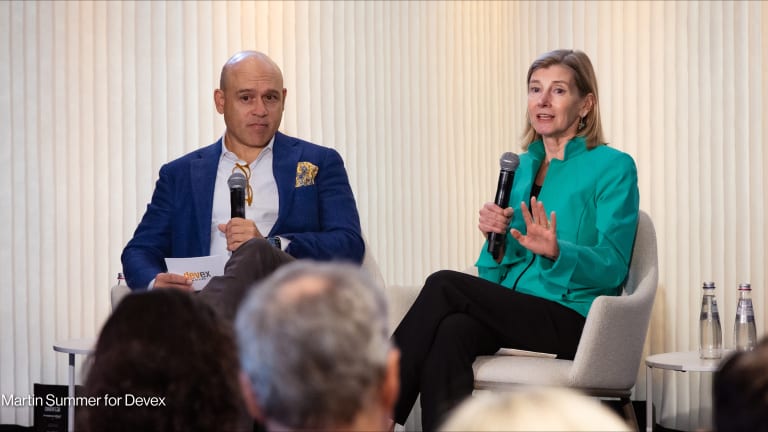
This article is produced and published by Devex Impact, a global initiative of Devex and USAID, that focuses on the intersection of business and global development and connects companies, organizations and professionals to the practical information they need to make an impact.
At the event launching the new report on development from the Center for Strategic and International Studies, Carly Fiorina spoke about the central role of public-private partnerships in the future of international development.
“The organizing principle of all of our development engagement should be a focus on shared prosperity, job creation and economic growth,” the former Hewlett-Packard Co. CEO and co-chair of the center’s Executive Council for Development said. “That must be the central mission of government, [nongovernmental organizations] and the private sector.”
Fiorina, who was defeated in her bid for a California Senate seat in 2010, was frank about the challenges of partnership.
“It’s not always easy to collaborate. Sometimes it’s because of silos, sometimes it’s a lack of trust. To collaborate effectively, we need to think differently about how our efforts are organized.” She called for a “rationalization and integration” of government-led development efforts to leverage more effectively the private sector’s resources.
Fiorina sat down with Devex Impact on the sidelines of the event to explain how her career in business and politics has resulted in her current focus on international development.
How did you become involved in international development?
I’ve been engaged in international development for quite some time, first as CEO of Hewlett-Packard. We pioneered a program called World e-Inclusion. It was a response to our employees who, all-around the world, wanted to get deeply engaged in making a difference for communities. What I saw through that program, where we invested deeply for three years in communities, is business’ ability to create skills, create jobs, lift people out of poverty — the impact was huge. And our employees were so engaged and excited about the work. And we found new customers and new employees. So I saw it work in real time.
Then I served on the Defense Business Board and got engaged in the whole issue of security and prosperity. My philanthropic activities, through the One Woman Initiative, got me very focused on the impact women can have in development. And CSIS is unique in its bipartisan approach in this town to very important issues, so this one was logical for me. So it’s been a journey.
You’ve said that public-private partnerships are a “necessity.” What explains your passion around this issue?
It comes from experience. Everyone on our council has seen what happens when it works really well. When it works well, it’s magic. Why? Because the U.S. government has such huge credibility around the world, and they do things that no one else can do. American companies are among the finest in the world, and American NGOs are among the finest. So when you can pull all that capability together, combined with values and compassion, that’s a very potent combination.
Yet there’s so much that doesn’t work well, and there’s so much need. That’s why we’re really passionate about taking these proof points, where it works, and magnifying and leveraging them so we can start to have a conversation about systematizing them.
Partnerships are often described as “difficult” and “requiring patience.” What’s in it for business?
What’s in it for business is better business. A business has to have an enlightened view, and enlightened self-interest is, by definition, a long-term self-interest. If all a company cares about is next month’s profits, maybe this doesn’t make sense. But frankly most companies today care about more than that.
[Partnership] means better business because there are so many markets and customers outside the [United States]. It’s better business because we know that exports are creating jobs here in this country. And, as a business person, I would argue that good business always takes time and patience.
Do you see greater interest now among business leaders to tackle development issues through partnership?
Yes. First, there is more recognition of the opportunities out there for business. Many of these countries we used to call “Third World” or “developing” are now rapidly growing markets. Second, I think there’s a recognition that getting into some of these markets is so challenging that a partnership with government makes sense. In some cases, businesses are literally brought to the opportunity by government agencies.
We’re hoping this report helps catalyze recognition that when we do this right, we have a huge impact. But there aren’t yet enough businesses engaged in [partnership], and it isn’t yet a natural habit of government to engage in this way. We hope to start the honest reflection, here in Washington, about what works well and what doesn’t. Some things will have to change so we can work better.
What can be done to make public-private partnerships easier to execute and therefore more appealing?
We start by having the conversation and having a shared agenda. That’s why we think having this organizing principle around global prosperity is so important. So partnership starts with a shared agenda, recognizing the value that each party brings, and focusing on enduring success.
Explore related content:
Join the 500,000-strong Devex community to network with peers, discover talent and forge new partnerships — it’s free! Then sign up for the Devex Impact newsletter to receive cutting-edge news and analysis every month on the intersection of business and development.








